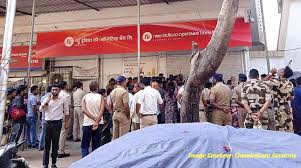CO-OP
RBI supersedes board of New India Co-operative Bank
Customers panic and queue up outside the bank's branches to withdraw money from their accounts; RBI appoints Shreekant, former CGM of SBI, as ‘Administrator’ to oversee operations.
Customers panic and queue up outside the bank's branches to withdraw money from their accounts; RBI appoints Shreekant, former CGM of SBI, as ‘Administrator’ to oversee operations.

A day after imposing business restrictions on New India Co-operative Bank, the Reserve Bank of India (RBI) superseded the board of the Mumbai-based bank and appointed Shreekant, a former chief general manager of State Bank of India, as the ‘Administrator’ to oversee the operations.
The replacement of the board of the bank will remain in effect for a period of 12 months, the RBI said.
The central bank also set up a 'Committee of Advisors' to assist the Administrator in managing the affairs of the bank. The committee members include Ravindra Sapra, a former general manager at SBI, and Abhijeet Deshmukh, a chartered accountant.
On Thursday, the RBI had barred the bank from issuing new loans or permitting deposit withdrawals for a period of six months due to poor governance standards, lending irregularities and liquidity position.
The central bank said that the restrictions on new loans and withdrawals from savings, current and other deposit accounts were aimed at safeguarding the interests of the bank's depositors.
"Considering the bank's present liquidity position, the bank has been directed not to allow withdrawal of any amount from savings bank or current accounts or any other account of a depositor...," the RBI said while imposing the restrictions.
The lender, however, has been allowed to set off loans against deposits subject to the conditions stated in the RBI directions. It may also incur expenditures on certain essential items such as salaries of employees rent, and electricity bills.
Meanwhile, hundreds of customers of the bank panicked and queued up outside the branches of the bank to withdraw money from their accounts, but were denied entry into the premises. Customers were allowed to withdraw money only from the locker.
“They say we can only withdraw money after six months. We have our EMIs to pay. We don’t know what to do,” many of the bank’s account holders said.
The bank has 28 branches, mostly located in the Mumbai region. It also has two branches at Surat in neighbouring Gujarat and one in Pune.
Under the deposit insurance scheme, depositors are eligible for insurance claims up to Rs 5 lakh. Around 90% of the 1.3 lakh depositors would get their entire deposits back from the Deposit Insurance and Credit Guarantee Corporation (DICGC).
As of March 2024, the bank held deposits of Rs 2,436 crore. According to the bank’s annual report, over two-thirds of the deposits were locked in term deposits. The assets stood at Rs 1,175 crore and the gross non-performing assets (NPA) ratio was at nearly 7.96% as of 31 March 2024.
The issue pertains to the misappropriation of funds by some bank staff members. The bank's chief compliance officer (CCO) approached the Mumbai Police's Economic Offence Wing after discovering some lapses in the RBI's 'spot inspection' of its books.
The bank was started in 1968 by staffers of a state-run general insurer with similar name. Unlike other co-operative banks, New India Co-operative Bank does not have any roots in a particular community.
